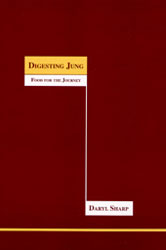Digesting Jung provides readers new to analytical psychology with the main ingredients of Jung’s work and how they might flavor a life.
In the book, Sharp covers complexes, archetypes, instincts, the four typology functions, the persona, the shadow, anima/animus, the Self, dreams, projection, neurosis, the analytical process and the way of individuation. Each chapter begins with an extract from Jung’s writings which Sharp then fleshes out – explaining, expanding and illuminating each idea. The brilliance of Sharp lies in his capacity to distill the complex concepts and ideas of Jung so that they become truly accessible and this makes this book invaluable for the reader new to analytical psychology.
This book moves the reader beyond the mere realm of thinking into a heuristic journey of self discovery, as Sharp says in the book:
“True healing does not happen in the head. It occurs through feeling-toned realizations in response to lived experience …. Thoughts ‘in the form of an experience’ have a transforming effect because they are numinous, overwhelming. They lead to a more balanced perspective: one is merely human – not entirely good (positive inflation) not entirely bad (negative inflation) but a homogenous amalgam of good and evil. The realization and acceptance of this is a mark of the integrated personality.” (p.60).
Digesting Jung, is illuminating, thought provoking and “stimulates the reader to ruminate on what is happening in his or her own life and the unconscious factors that for good or ill influence the lives of each of us.”
The book is full of provoking questions, encouraging you to discover and become aware of the way in which you function, to assess your attitudes and behavior in a given situation and adjust them accordingly:
“…in this situation, with that person, how did I function and with what effect? Did my actions truly reflect my judgements (thinking and feeling) and perceptions (sensations and intuition)? And if not, why not? What complexes were activated in me? To what end? What does this say about my psychology? What can I do about it? What do I want to do about it?” (p.20)
As Sharp says “Jungian analysis is not about improving yourself or making you a better person. It is about become conscious of who you are, including your strengths and weaknesses” (p.58) so that “the truth of yesterday … be set aside for what is now the truth of one’s psychic life” Marie-Louise van Franz, Redemption Motifs in Fairy tales, p.85).
